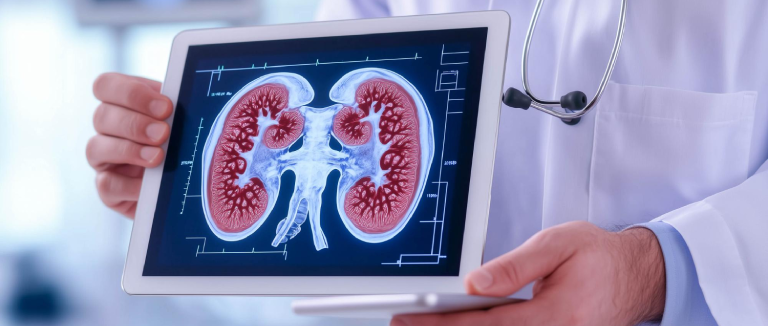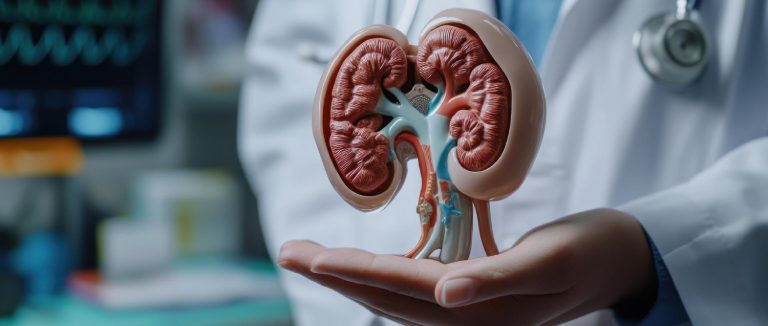What is Kidney Disease?
Kidney disease occurs when the kidneys are no longer able to function properly. The kidneys play essential roles in the body, including removing waste products and excess fluid, maintaining the balance of electrolytes, regulating blood pressure, and supporting the production of red blood cells. When kidney failure develops, these vital processes are disrupted, which can result in serious health complications.

Types of Kidney Disease
Kidney disease is generally classified into two types: acute and chronic. Acute kidney disease occurs suddenly and is often reversible with appropriate treatment. In contrast, chronic kidney failure develops gradually over time and is a progressive condition that results in permanent kidney damage.
- Acute Kidney Failure (AKF)
- This refers to the sudden and rapid decline in kidney function.
- Common causes include infections, trauma, dehydration, blood loss, certain medications, and exposure to toxins.
- With early diagnosis and prompt treatment, acute kidney disease is often reversible.
- Symptoms may include reduced urine output, swelling, nausea, vomiting, fatigue, and shortness of breath.
- Chronic Kidney Failure (CKF)
- This refers to the gradual and irreversible loss of kidney function over time.
- It is most commonly caused by chronic conditions such as diabetes, high blood pressure, glomerulonephritis (kidney inflammation), or polycystic kidney disease.
- Progression is often gradual, and symptoms may take a long time to become apparent.
- Common symptoms are fatigue, loss of appetite, weight loss, itching, changes in urination, swelling, and anemia.
Stages of Chronic Kidney Disease Chronic kidney failure is classified into five stages, determined by the degree of kidney function loss.
- Stage 1: Kidney damage is present, but function is normal or only slightly reduced.
- Stage 2: Mild reduction in kidney function.
- Stage 3: Moderate reduction in kidney function.
- Stage 4: Severe reduction in kidney function.
- Stage 5 (End-Stage Kidney Failure): The kidneys can no longer meet the body’s needs, so dialysis or kidney transplantation is necessary.
There are also other types of kidney failure classified according to their underlying causes:
- Prerenal Acute Kidney Failure: Caused by inadequate blood flow to the kidneys.
- Renal Acute Kidney Failure: Caused by direct damage to the kidneys.
- Postrenal Acute Kidney Failure: Caused by obstruction in the urinary tract.
What Causes Kidney Failure?
Kidney failure develops when the kidneys can no longer carry out their normal functions. It can result from a variety of factors. The main causes of kidney disease include:
- Diabetes:
- High blood sugar gradually damages blood vessels in the kidneys (diabetic nephropathy).
- Hypertension (High Blood Pressure):
- Chronic high blood pressure damages kidney vessels and reduces filtering capacity.
- Kidney Stones:
- Stones block the urinary tract and, over time, damage kidney tissue.
- Infections and Inflammations:
- Kidney infections (e.g., pyelonephritis) or inflammatory diseases impair kidney function if left untreated.
- Genetic Diseases:
- Disorders like polycystic kidney disease cause cysts to form in the kidneys, impairing function.
- Medications and Toxins:
- Overuse of certain drugs (e.g., NSAIDs) or toxic substances damages the kidneys. Some drugs may have side effects that lead to kidney disease.
- Acute Kidney Injury:
- Severe infections, blood loss, extreme dehydration, blocked kidney vessels, or drug-induced injury cause sudden kidney failure.
- Damage to Kidney Blood Vessels:
- Diseases like atherosclerosis impair blood flow and kidney function.
- Excessive Alcohol and Smoking:
- Long-term use disrupts fluid balance (alcohol) or narrows vessels (smoking), harming kidney health.
- Kidney Tumors and Cancer:
- Cancer and similar diseases directly damage kidney tissue, leading to failure.
If left undetected, kidney failure can cause serious health complications. Regular check-ups and a healthy lifestyle are essential for maintaining kidney health and preventing future problems.
Symptoms of Kidney Disease
Symptoms vary depending on the type and stage of Kidney disease and may include fatigue, appetite loss, nausea, swelling, shortness of breath, and blood in the urine. Chronic cases progress slowly, while acute cases appear suddenly and severely.

How is Kidney Failure Treated?
Treatment options for kidney failure depend on the disease’s stage and type. Acute kidney failure is often reversible with proper intervention, while chronic kidney failure typically requires more complex and long-term care. The main treatment methods for kidney failure include:
1. Treatment of Acute Kidney Failure:
Acute kidney failure is often reversible with appropriate treatment. The main therapeutic approaches include:
- Fluid and Electrolyte Balance: Fluid and electrolyte imbalances in the body, caused by the kidneys’ inability to remove excess fluid, are corrected.
- Dialysis: If the kidneys are unable to remove waste products and excess fluids, the patient may need hemodialysis or peritoneal dialysis..
- Medication: If acute kidney failure is due to infection, poisoning, or medication side effects, appropriate treatments are administered to address the underlying cause.
- Treating the Underlying Cause: It is essential to treat the underlying cause of acute kidney failure, such as managing infections, correcting dehydration, or controlling blood pressure.
2. Treatment of Chronic Kidney Failure:
Chronic kidney failure is a progressive condition that requires ongoing, long-term management. Treatment options include:
- Medications: Medical Treatments for Chronic Kidney Failure:
- ACE inhibitors and ARBs are commonly used to protect kidney function.
- Diuretics (water pills) help control fluid retention.
- Erythropoietin is used to treat anemia in patients with kidney failure.
- Various medications are used to protect kidney function and slow disease progression:
- ACE inhibitors and ARBs: Commonly prescribed to help protect kidney function and control blood pressure.
- Diuretics (water pills): Help reduce fluid retention.
- Erythropoietin: Used to treat anemia associated with kidney failure.
- Other drugs may help control blood sugar and further support kidney health.
- Diet and Lifestyle Changes:
- A low-protein diet, limited salt, and restricted potassium intake are advised for patients with kidney failure.
- Maintaining regular exercise and adopting a healthy lifestyle can also help improve overall kidney health.
Kidney Transplant
A kidney transplant is a surgical procedure in which a healthy kidney from a donor is placed into a patient with kidney failure. This option is generally considered when kidney function has completely failed and the patient relies on dialysis. A successful kidney transplant can significantly improve quality of life and extend the lifespan of individuals with kidney failure.
Kidney Transplant Process:
1. Selecting Suitable Candidates for Kidney Transplant:
- Patients with chronic kidney failure may be eligible for a kidney transplant. However, eligibility depends on the absence of significant other health problems. Suitable candidates should have healthy organs, minimal infection risks, and be mentally and emotionally prepared for the transplant process.
2. Donor Selection: There are two types of kidney donors:
- Living Donor: A family member or close friend can donate a healthy kidney. Transplants from living donors typically have higher success rates.
- Deceased Donor: A kidney can also be transplanted from a person who has been declared brain-dead. In this situation, a suitable kidney must be identified. Compatibility between the donor and recipient is essential, which is determined by tissue typing (HLA testing) and blood group matching.
3. Kidney Transplant Surgery:
- During a kidney transplant, the new kidney is surgically placed in the patients abdomen, while the non-functioning kidneys are typically left in place. The procedure is performed under general anesthesia and usually takes several hours.
4. Post-Surgery Recovery:
- After the transplant, patients stay in the hospital for observation and monitoring. Recovery may take several weeks. To prevent rejection, patients must take immunosuppressive medications, which help the body accept the new kidney but also increase susceptibility to infections..
Advantages of Kidney Transplant
- Benefits of Kidney Transplantation:
- Improved Quality of Life: Patients can stop dialysis and become more active in daily activities.
- Longer Lifespan: Transplant recipients generally live longer than those who remain on dialysis.
- Fewer Limitations: Most dietary, fluid, and travel restrictions associated with dialysis are lifted after transplantation..

Dialysis Treatment
Dialysis is an essential treatment for people with kidney failure. When the kidneys can no longer filter waste products and excess fluids from the blood, dialysis performs this function, effectively cleansing the blood and helping to maintain the body’s fluid and electrolyte balance.
Goals of Dialysis Treatment:
- Remove waste products and toxins from the body
- Reduce swelling by eliminating excess fluid
- Maintain proper electrolyte balance
- Regulate blood pressure
- Alleviate symptoms of kidney failure
- Improve overall quality of life
Dialysis Treatment Methods:
There are two main types of dialysis:
- Hemodialysis: The patient’s blood is removed from the body and filtered through a dialysis machine to eliminate waste products and excess fluids. The cleaned blood is then returned to the body. Hemodialysis is typically performed three times a week, with each session lasting several hours.
- Peritoneal Dialysis: A catheter is inserted into the abdominal cavity, and a special dialysis fluid is infused. This fluid absorbs waste products and excess fluid from the blood through the abdominal lining. After several hours, the fluid is drained and replaced with fresh solution. Peritoneal dialysis is usually performed more frequently and on a regular basis compared to hemodialysis.
Who is Dialysis Treatment for?
Dialysis is generally recommended for patients with kidney failure in the following situations:
- End-stage kidney failure
- Progressive kidney failure with worsening symptoms
- Temporary treatment for acute kidney failure
- Emergency situations such as dangerously high potassium levels
Side Effects of Dialysis Treatment:
Dialysis treatment may cause side effects such as infections, low blood pressure, muscle cramps, fatigue, anemia, or skin problems. Most of these side effects are manageable and can be effectively treated.
Dialysis Treatment Process:
Dialysis requires a coordinated team approach. Nephrologists, dialysis nurses, and other healthcare professionals continuously monitor and manage each patient’s care. Dialysis can greatly improve quality of life and help extend lifespan for those with kidney failure.
3. Treating the Underlying Cause
If kidney failure results from underlying conditions such as diabetes, hypertension, or kidney infections, it is essential to treat these diseases directly. For example:
- Managing Diabetes: Keeping blood sugar levels under control can help slow kidney damage.
- Treating Hypertension: Effectively managing high blood pressure helps protect kidney function.
* Liv Hospital Editorial Board has contributed to the publication of this content .
* Contents of this page is for informational purposes only. Please consult your doctor for diagnosis and treatment. The content of this page does not include information on medicinal health care at Liv Hospital .
For more information about our academic and training initiatives, visit Liv Hospital Academy
Frequently Asked Questions
What causes kidney disease?
Kidney disease is most commonly caused by diabetes, high blood pressure, infections, genetic conditions, and long term medication use.
What are the early symptoms of kidney disease?
Fatigue, swelling, changes in urination, nausea, and loss of appetite are common early signs.
Is acute kidney failure reversible?
Yes, with timely treatment acute kidney failure can often be reversed.
What is chronic kidney disease?
It is a long term, progressive loss of kidney function that may eventually require dialysis or a transplant.
How is kidney disease diagnosed?
Diagnosis includes blood tests, urine tests, imaging scans, and sometimes kidney biopsy.
What is the main treatment for advanced kidney failure?
Advanced kidney failure is treated with dialysis or kidney transplantation.
Can kidney disease be prevented?
Yes. Managing blood sugar, controlling blood pressure, staying hydrated, and avoiding excessive medication use help prevent kidney disease.
What is dialysis?
Dialysis is a treatment that filters waste and excess fluid from the blood when the kidneys can no longer do so.
Who needs a kidney transplant?
Patients with end stage kidney failure who are healthy enough for surgery may be candidates for a transplant.
Does kidney disease cause symptoms immediately?
No, chronic kidney disease often develops silently and symptoms may not appear until significant damage occurs.























